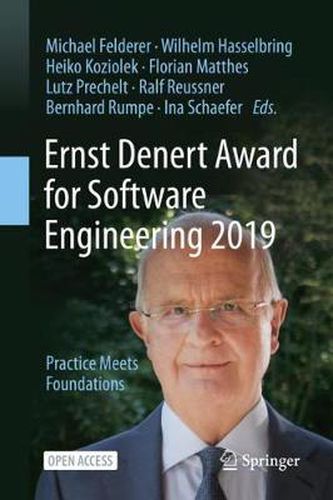Readings Newsletter
Become a Readings Member to make your shopping experience even easier.
Sign in or sign up for free!
You’re not far away from qualifying for FREE standard shipping within Australia
You’ve qualified for FREE standard shipping within Australia
The cart is loading…






This title is printed to order. This book may have been self-published. If so, we cannot guarantee the quality of the content. In the main most books will have gone through the editing process however some may not. We therefore suggest that you be aware of this before ordering this book. If in doubt check either the author or publisher’s details as we are unable to accept any returns unless they are faulty. Please contact us if you have any questions.
This open access book provides an overview of the dissertations of the five nominees for the Ernst Denert Award for Software Engineering in 2019. The prize, kindly sponsored by the Gerlind & Ernst Denert Stiftung, is awarded for excellent work within the discipline of Software Engineering, which includes methods, tools and procedures for better and efficient development of high quality software. An essential requirement for the nominated work is its applicability and usability in industrial practice.
The book contains five papers describing the works by Sebastian Baltes (U Trier) on Software Developers'Work Habits and Expertise, Timo Greifenberg’s thesis on Artefaktbasierte Analyse modellgetriebener Softwareentwicklungsprojekte, Marco Konersmann’s (U Duisburg-Essen) work on Explicitly Integrated Architecture, Marija Selakovic’s (TU Darmstadt) research about Actionable Program Analyses for Improving Software Performance, and Johannes Spath’s (Paderborn U) thesis on Synchronized Pushdown Systems for Pointer and Data-Flow Analysis - which actually won the award.
The chapters describe key findings of the respective works, show their relevance and applicability to practice and industrial software engineering projects, and provide additional information and findings that have only been discovered afterwards, e.g. when applying the results in industry. This way, the book is not only interesting to other researchers, but also to industrial software professionals who would like to learn about the application of state-of-the-art methods in their daily work.
$9.00 standard shipping within Australia
FREE standard shipping within Australia for orders over $100.00
Express & International shipping calculated at checkout
This title is printed to order. This book may have been self-published. If so, we cannot guarantee the quality of the content. In the main most books will have gone through the editing process however some may not. We therefore suggest that you be aware of this before ordering this book. If in doubt check either the author or publisher’s details as we are unable to accept any returns unless they are faulty. Please contact us if you have any questions.
This open access book provides an overview of the dissertations of the five nominees for the Ernst Denert Award for Software Engineering in 2019. The prize, kindly sponsored by the Gerlind & Ernst Denert Stiftung, is awarded for excellent work within the discipline of Software Engineering, which includes methods, tools and procedures for better and efficient development of high quality software. An essential requirement for the nominated work is its applicability and usability in industrial practice.
The book contains five papers describing the works by Sebastian Baltes (U Trier) on Software Developers'Work Habits and Expertise, Timo Greifenberg’s thesis on Artefaktbasierte Analyse modellgetriebener Softwareentwicklungsprojekte, Marco Konersmann’s (U Duisburg-Essen) work on Explicitly Integrated Architecture, Marija Selakovic’s (TU Darmstadt) research about Actionable Program Analyses for Improving Software Performance, and Johannes Spath’s (Paderborn U) thesis on Synchronized Pushdown Systems for Pointer and Data-Flow Analysis - which actually won the award.
The chapters describe key findings of the respective works, show their relevance and applicability to practice and industrial software engineering projects, and provide additional information and findings that have only been discovered afterwards, e.g. when applying the results in industry. This way, the book is not only interesting to other researchers, but also to industrial software professionals who would like to learn about the application of state-of-the-art methods in their daily work.